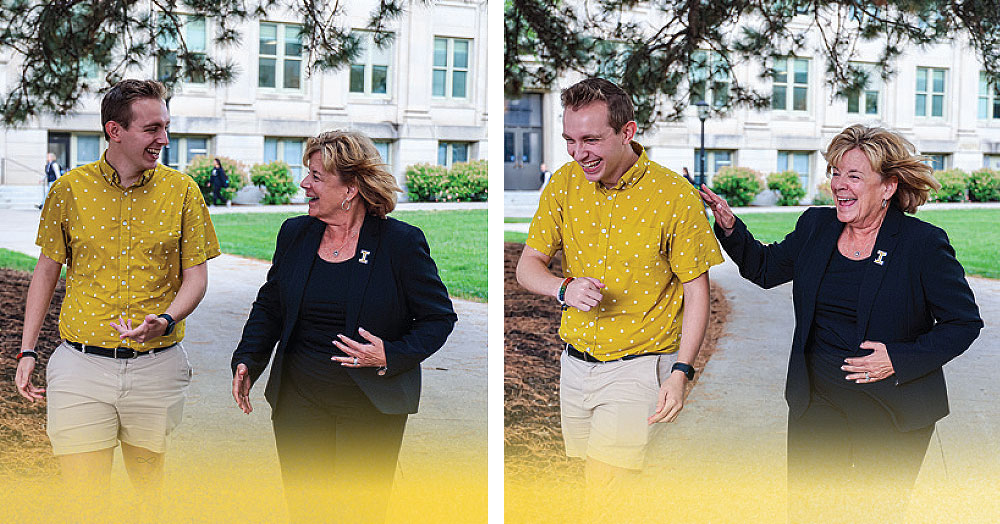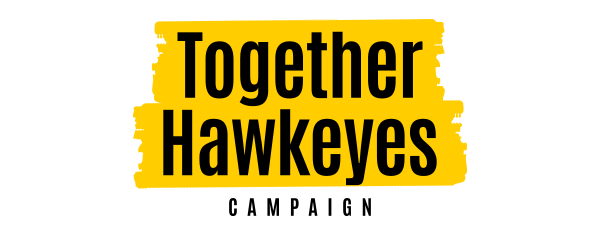In a conversation with student leader Mitch Winterlin, Wilson outlines an ambitious and innovative plan to strengthen the Hawkeye community.
 PHOTOS: JOHN EMIGH
PHOTOS: JOHN EMIGH
This past October, the University of Iowa launched the Together Hawkeyes campaign, which strives to reach 300,000 alumni and friends, provide 3 million points of connection, and raise $3 billion to help make the UI’s aspirations a reality. From introducing new student support programs to developing initiatives to boost mental health on campus, UI President Barbara Wilson recently broke down her biggest campaign priorities in a Q&A with UI Undergraduate Student Government president and senior Mitch Winterlin.
WINTERLIN:
What are the major goals of the campaign, and why is involvement from alumni and friends—whether through engagement or private support—so crucial to our university success?
WILSON: When I boil down the most critical aspects of the campaign for me, it’s about supporting people: supporting students, supporting faculty, supporting staff. We are in a fiercely competitive environment to attract and retain talent, so the more support we can create, the better we’ll be as a university. A lot of our campaign will be focused on students: How do we support students? How do we attract them to Iowa, and how do we keep them here? And how do we help them graduate? There’ll be support avenues for faculty and staff too: How do we recruit the smartest faculty and staff, and how do we keep them here at Iowa?
WINTERLIN:
I love that, and one of the things I’m most excited for with the campaign is the engagement aspect, and that it’s not just about giving. There are a lot of ways to contribute.
I’m also grateful to Hawkeyes who invest in students, including through supporting scholarships and programs like First Gen Hawks. I was the first in my family to go to college, and First Gen Hawks provided the resources I needed to navigate my first year at Iowa. And now I have the opportunity to help other first-gen students. How can all Hawkeyes contribute to student success? And what difference do programs like First Gen Hawks make?
WILSON: More than one in five of our undergraduates is first-in-family to go to college. And many of those students come to campus and feel unsure they’re going to succeed, so the First Gen Hawks program is one that we know works well. We can increase retention by 10 percentage points for students who are in that program during their first year. The goal is to enlarge the program in terms of the number of students it serves and extend it to year two. It’s a great example of the different ways that alumni, donors, and friends can contribute. You can help support students financially, you can help by mentoring students, and you can help by providing internships for students. It’s not all about the financial aspect, but certainly that’s a big part of it.
WINTERLIN:
My favorite part of the First Gen Hawks program is the three different tracks. Those are leadership and engagement, research, and employment. I love that students can choose.
WILSON: Exactly! And on the employment side, another program I’m proud of is the Iowa GROW (Guided Reflection on Work) program. If you have a student who’s employed in your office or your unit at Iowa, you can sign up for the program, and it commits you to a couple conversations every month with the student, asking questions such as, “How does this job influence your career aspirations? What are you learning? How are you defining and honing your communication skills?” That staff person then becomes a mentor for that student. The student is getting paid, the staff member is contributing on a mentoring basis, and we’ve got campus employment covered, so it’s a great program, and it’s part of what we’re encouraging for first-gen Hawks and for all students.
WINTERLIN:
I remember doing that. Being able to talk about my skills was a positive thing. And I think, especially for many first-gen students coming in, they may not realize, “Oh, the job I have on campus is helping me build skills that I can use in my career.”
WILSON: And it's valuable to have a staff member who cares about you enough to say, “When’s your next exam? How did you do on that last one? Do you need more study time?” Those are the kinds of relationships that make a difference for students.
WINTERLIN: The University of Iowa has made it a priority to care for the mental health and well-being of our campus community. Can you share what strides Iowa is making in this area and your vision for what resources we can build together as Hawkeyes?
“There’s something here that makes people feel connected early on, and when they join the Hawkeye family, whether they went to school here or not, they feel a part of a supportive community.”—UI President Barbara Wilson
WILSON: Holistic well-being is one of the five priorities in our strategic plan, and that is not true of every university out there. We have made a point to say to students, faculty, and staff, “You can’t be a fully functioning leader without taking care of both your physical and your mental health.” So, we’re paying attention to things we can do as a campus to ensure that all of our community gets access to resources and opportunities that foster mental health. One of the resources we created was a 24-hour, seven-day-a-week phone/text/chat service that students can use for mental health emergencies. And the great thing is the person on the other end is a local professional who specializes in student mental health.
We’re also embedding mental health professionals in some of our colleges. And we’re embedding them in some of our residence halls. These individuals make sure students are thinking about how much sleep they’re getting and whether they’re managing stress OK. You can go in there and have a quick conversation with someone: “I’m struggling with time management; can I get some tips?” Such opportunities are more preventative in building resiliency and coping skills. We’re trying to create a range of options and services for students.
And then the ultimate goal is to get more services in the Iowa Memorial Union. We’re revamping the IMU, and it’s going to have, front and center, a large student wellness component that’s easy to access. Our clothing closet and food pantry are there, but we also want to include a range of professionals who are ready to help students think about mental health on a daily basis.
WINTERLIN: I love seeing the priorities with mental health and well-being. It’s not just, “We’re going to have a therapist here now; everything’s cured.” Instead, we’re looking at it from the holistic mindset of basic needs, like: Do we have food security for students? Do we have accessibility to clothing?
WILSON: And then there’s teaching people how to identify their levels of stress and how to manage those stresses, how to talk about them, and how to build in coping skills and preventative strategies. We don’t want to wait until the crisis occurs. We can’t take away the stress in society, but we can build resilient individuals in the face of stress, and then occasionally we’ll deal with crises too. But I think the more preventative and open we can be about stress and anxiety, the better off we’re going to be in the long run. And we’re going to help the next generation manage the issues that can cause stress—and they’ve changed considerably, even in the last 10 years. When I was a student, I never thought about a pandemic, and there was no social media. If somebody was bugging me, I could go back to my apartment, and it was over. Now you all are carrying phones around, and everything’s in your face 24/7. I think sometimes we forget that’s a different level of stress.
WINTERLIN: We never unplug. We never disconnect. But I think helping students develop those skills is something that’s so critical.
OK, last question: The campaign is called Together Hawkeyes, so I’m curious what qualities come to mind when you think of our Hawkeye community.
Personally, one of my favorite qualities that has drawn me into Iowa is passion. I feel like every Hawkeye I meet—whether it’s a fan, a friend, or a student on campus—is happy to be a Hawkeye. My cousin who lives in California has Hawkeye merch on all the time. She will be walking around Sacramento, and someone will say, “Go, Hawks!” I don’t see that same energy with other universities. I think that’s a sign of pride and passion. That’s why I’m excited to see what this campaign does, because Hawkeyes know how to get passionate.
WILSON: The qualities I always mention are, number one, comprehensive excellence. I love the fact that we are strong across different disciplines, from neuroscience to nursing to nonfiction writing. It’s such an array of stunning disciplines and strengths across different aspects of the university. Not every university is as balanced in its excellence as we are. Two, creativity. We’re oozing creativity everywhere here. And it’s not just because of our strength in writing, but it’s in the STEM fields and the performing arts. Three, community. This is a place where people can get connected easily, and people care. We hear over and over when people come to visit, “This place is amazing!” There’s something here that makes people feel connected early on, and when they join the Hawkeye family, whether they went to school here or not, they feel a part of a supportive community.
This interview has been edited for length and clarity.
 PHOTOS: JOHN EMIGH
PHOTOS: JOHN EMIGH

